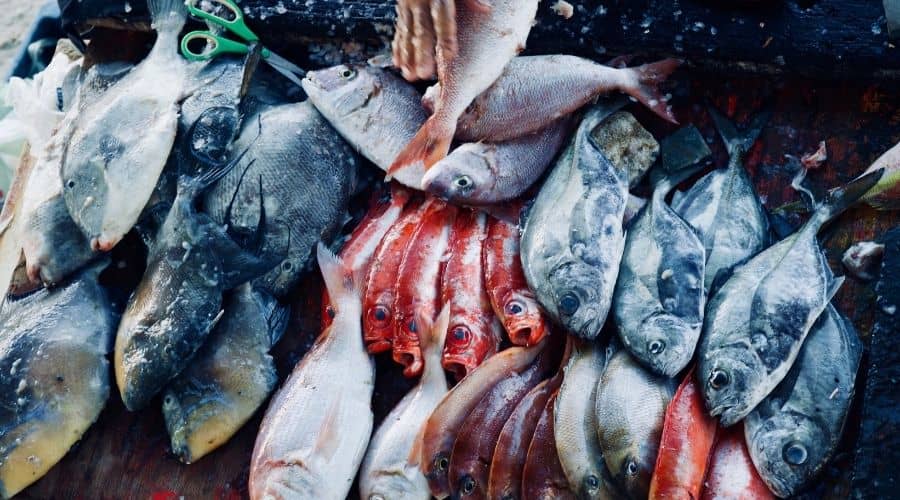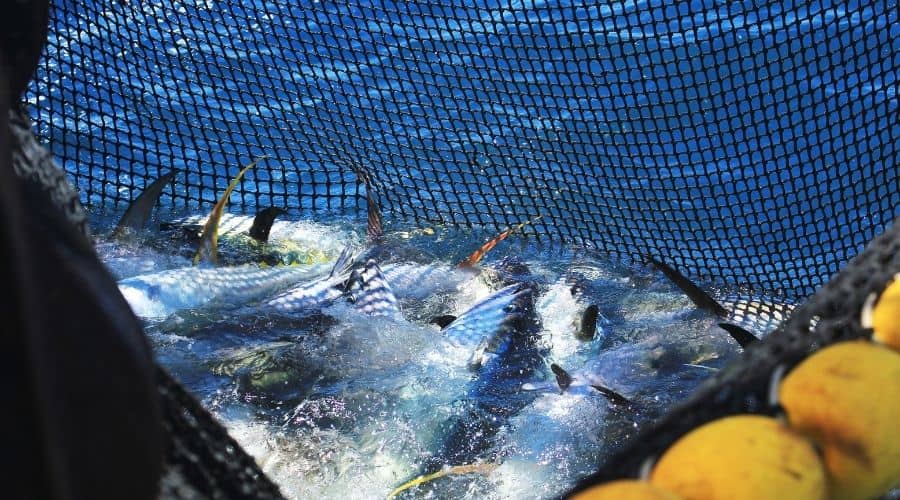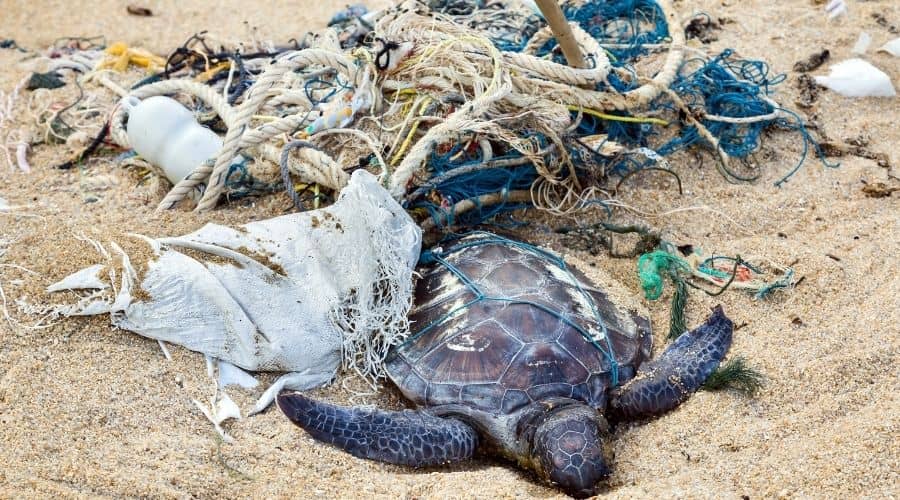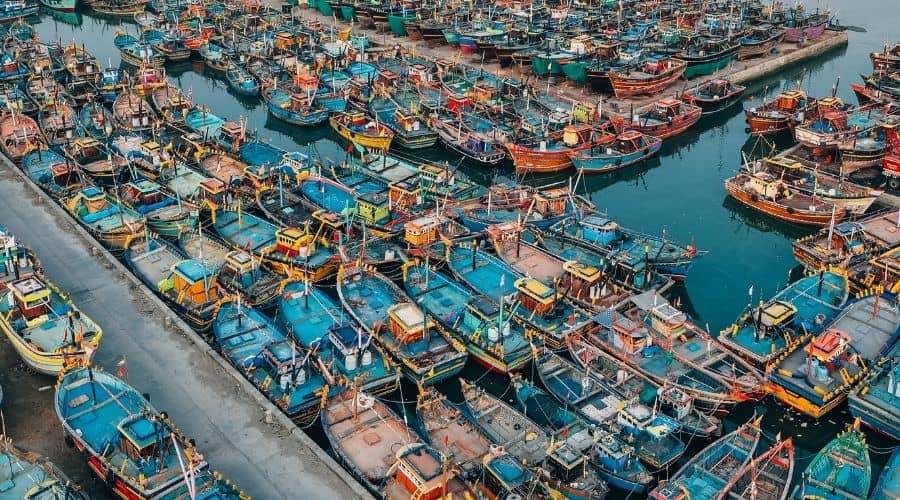
The effects of overfishing are a major global challenge threatening ocean wildlife, livelihoods, and seafood for future generations.
With oceans taking up over 70% of the Earth, sea creatures and the overall health of marine life are essential for sustaining life elsewhere on the planet. Overfishing by humans, however, is quickly depleting marine life, thus threatening life on Earth.
To help you grasp the extent of damage caused by overfishing, this article looks at:
- What is overfishing,
- What causes overfishing,
- Effects of overfishing,
- How to stop overfishing.
What is Overfishing and Why is it a Big Problem?
According to World Wildlife Fund (WWF), “overfishing occurs when more fish are caught than the population can replenish through natural reproduction.”
Overfishing is a big problem because it endangers ocean ecosystems and billions of people who rely on seafood as either a source of income or food. Widespread overfishing has also left nearly a third of the world’s assessed fisheries in deep trouble. If this menace continues, our fisheries may collapse— and we face a food crisis.
Causes of Overfishing
So what causes overfishing? There are numerous reasons for overfishing. The major ones include:
Poor fisheries management
Poor fishing management is one of the biggest causes of overfishing. Many fisheries worldwide are governed by insufficient fishing regulations or have no rules at all. Most existing laws usually are not enforced, especially on high seas, leaving fishers to do as they please.
Poor fishing methods and gear
In most cases, fishing encompasses the use of nets, fishing methods, and other fishing gear that catch so much fish to a level that they are endangered. The methods used also catch other sea creatures other than fish in the process. The unwanted animals usually are destroyed and discarded into the sea. These animals include turtles, cetaceans, young fish, sharks, corals, and seabirds.

Illegal and unregulated fishing activities
Illegal fishing activities such as poaching, taking more than the allowed amount of catch and fishing out of season lead to overfishing. Statistics show that illegal fishing activities account for about 20 percent of the world’s catch and up to 50 percent in some fisheries.
Economic and food needs
The more consumers demand fish, the bigger the fish market, and consequently, the fishers are compelled to catch more fish than the seas can replace.
What Are the Effects of Overfishing?
Overfishing problems are rampant worldwide and cause many profound social, economic, and environmental implications. Here are some of the significant effects of overfishing:
How Does Overfishing Affect Humans?
Millions of people worldwide depend on fishing as a source of livelihood and nutritional value. Oceans have had a good source of seafood for years, but overfishing is quickly stripping the oceans of their fish supply. With no valuable fish left in the waters to fish, the fishing industry is on the verge of collapse and will affect many people’s everyday way of life and source of income.
Overfishing Effects on Animals
Overfishing depletes essential predators such as sharks, tuna, and billfish, which disrupts the marine ecosystem resulting in increased numbers of smaller marine animals below the food chain. A disrupted ecosystem results in increased algae growth, and coral health becomes compromised as well.
Unnecessary loss of a massive population of marine animals like turtles occurs when fishers catch other sea creatures other than fish and discard them. These untargeted species soon turn into endangered species.

How Does Overfishing Affect the Environment?
Oil and chemical spills in high seas caused by fishing boats, trawlers, and vessels are a significant source of ocean pollution. Slight pollution by thousands of fishing vessels every day results in a massive disturbance to marine life. Additionally, water pollution has grave consequences to both aquatic and terrestrial lifeforms.

Consequences of Overfishing if It Continues
Continued overfishing will have drastic effects on the future of both ocean and land dwellers. If we do nothing to curb overfishing, fishers will reduce fish stocks to below acceptable levels. When this happens, millions of people who depend on fishing for their livelihood and billions of people who rely on fish as their key source of protein will suffer. Additionally, we’ll continue to witness a biodiversity loss in the ocean ecosystem.
Solutions For Overfishing: What You Can Do to Stop it
Yes, overfishing is a significant problem, and solutions to overfishing may seem out of your control, but there are a few ways you can help.
Change your habits
- Be more aware of the seafood you buy and eat: Educate yourself about endangered fish and which areas of the world the fish comes from. This way, you will not purchase such fish.
- Purchase your seafood from sustainable fisheries: Insisting on buying sustainably sourced seafood will put more pressure on fisheries to comply with the standards.
- Buy certified seafood: When shopping for seafood, look for the Marine Stewardship Council (MSC) blue fish tick label. The label means the seafood came from an MSC-certified sustainable fishery.
Use Your Voice
Another great overfishing solution you can try at an individual level is to petition your government and local council to put in place and enforce fishing regulations and policies. You can also support groups, like the World Wildlife Fund, helping countries learn to prepare adequate and effective management protocols.
Because fishing in itself isn’t destructive, it’s easy to dismiss overfishing as a harmless practice and go on with life oblivious to overfishing effects on the world’s ocean, marine life, human life, and environment. But now that you understand the causes, problems, and how to stop overfishing, you can do your best to curtail it.
You Might Also Like:

![]() Stella - Writer
Stella - Writer
Stella is a writer and mother from Thika, Kenya.
Her love for nature and the beautiful Kenyan outdoors has inspired Stella to consciously make an effort to lead a more sustainable, eco-friendly lifestyle.


